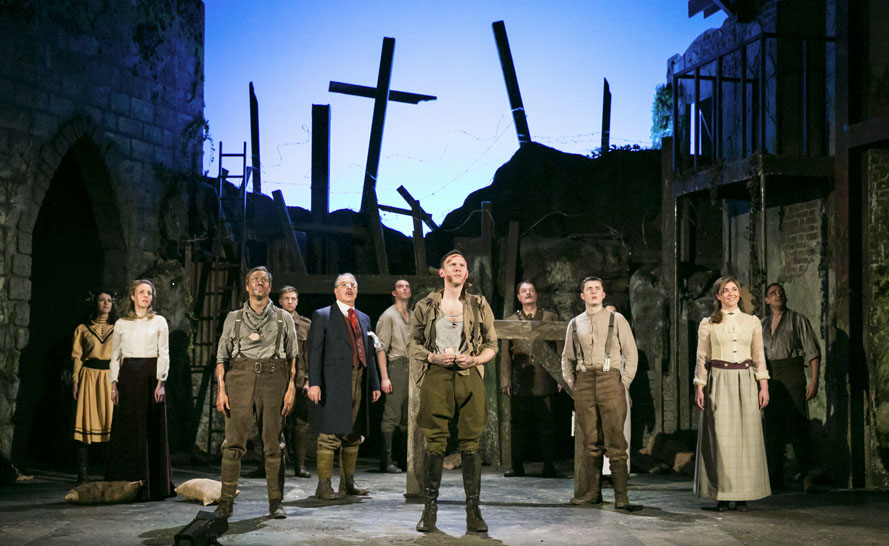
Birdsong is not the most obvious book for stage adaptation. It’s long-form and multi-stranded narrative does not easily lend itself to a neat two-and-a-half-hour runtime required for a play with appeal to general audiences. This staging, performed under the stewardship of Trevor Nunn in its first iteration back in 2010, is a masterful example of an adaptation for the stage. Reworked creatively and quite brutally by Rachel Wagstaff, Birdsong captures the key thematic and emotional elements of Sebastian Faulks’ book. This latest production is every bit as powerful as when it first came out.
The protagonist of the piece is Stephen Wraysford, a lieutenant serving on the front lines of the First World War. Over the course of Birdsong, we chart his emotional turmoil in two times periods: leading men to their deaths over the course of the war, and some years previously when he falls madly in love with the wife of his patron whilst working in Amiens, France. The story spreads to encompass not only Stephen and his love Isabelle but the men under his command, sappers in the Royal Engineers. The course of events charts a history of trauma and consequence, where the characters must cope with the emotional turmoil of events and actions that they cannot always control and only rarely understand.
In terms of WWI narratives, one of the things that sets Birdsong apart is its focus on the sappers. As much as you see the suicidal endeavour of going over the top, a lot more of the wartime experience here is about being trapped underground in dim, sweltering tunnels. Blood seeps down from the battlefield fifty feet above and shell fire becomes a muffled background if it is heard at all. In the eerie silence, the sappers await the sudden and terrible BANG of a mine going off prematurely or a German counter-tunnel breaking through. It would remiss to ignore the technical details of this often-overlooked aspect of trench warfare which the play dedicates so much to explaining.
In terms of staging, this is a remarkably busy play where the actors must reform the set rapidly between tunnels, trenches, barracks, and idyllic bygone days in a French town. There are only so many variations on a set built out of a trench and I am always impressed with how versatile productions can be in repurposing an edifice of mud, barbed wire and corrugated iron into just about anything.
This being a human narrative, it is the acting that really carries the day. This is sombre and affecting subject matter: a rum performance could be worse than artistically displeasing, it could be downright disrespectful. The cast is thankfully more than capable of delivering on Faulks and Wagstaff’s work. Tom Kay is very engaging as Wraysford, a man at first steely and inscrutable who we see the layers pulled back from over the course of the play. Madeliene Knight as Isabelle does a great job of playing Isabelle, a woman trapped in a cycle of monotonous brutality comparable to Stephen’s later experience, and much like him caught between duty and a desire for escape. In a strong cast, it always seems unfair to single someone out but Tim Treloar as Jack Firebrace, the nominal leader of the sappers, is outstanding. The play opens on him and he provides a through-line of noble fortitude in the face of ceaseless torment and degradation. His performance encapsulates humour, loss and perseverance: all essential cornerstones of what Birdsong is about. ★★★★★ Fenton Coulthurst 20th February 2018

